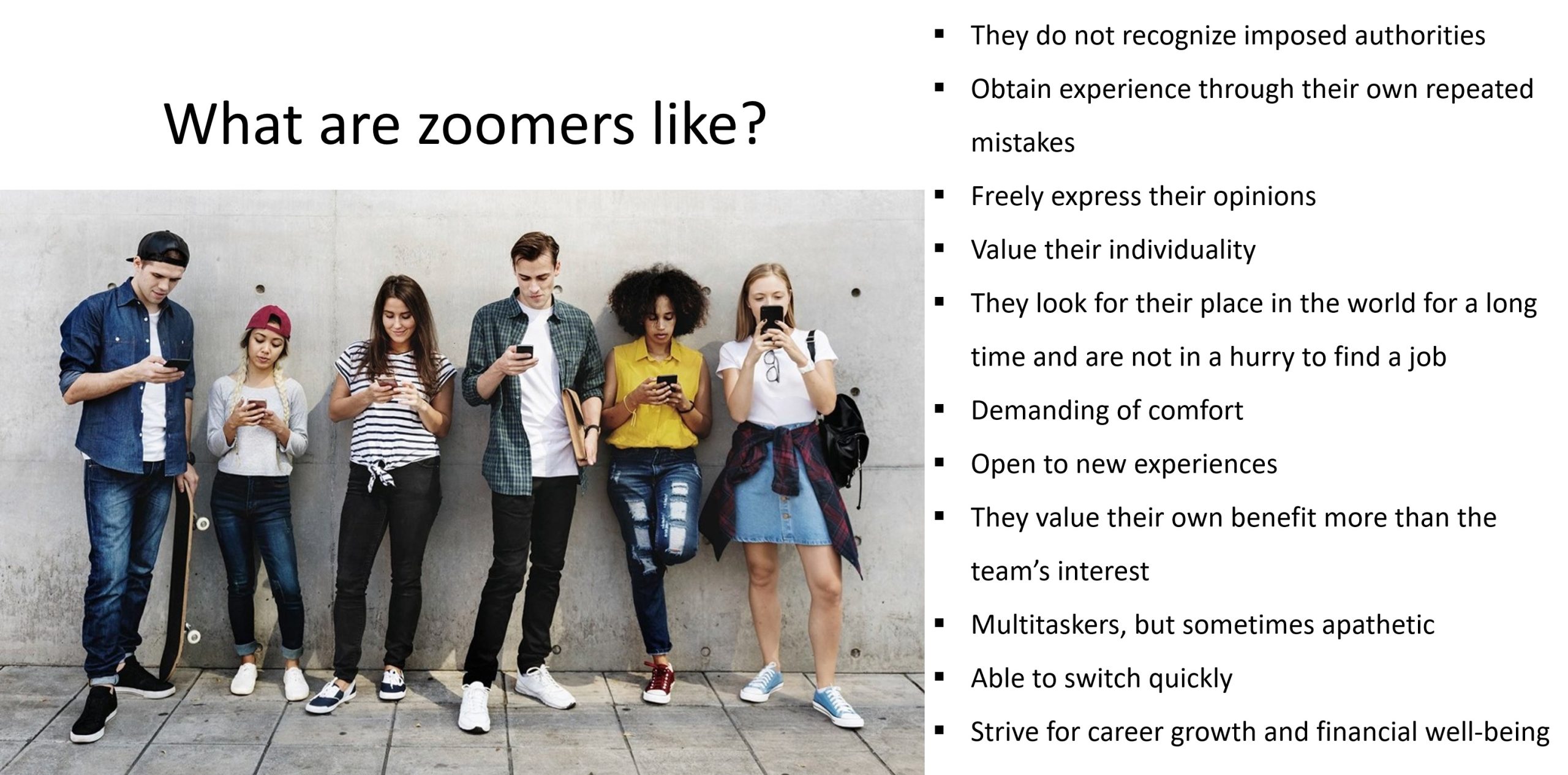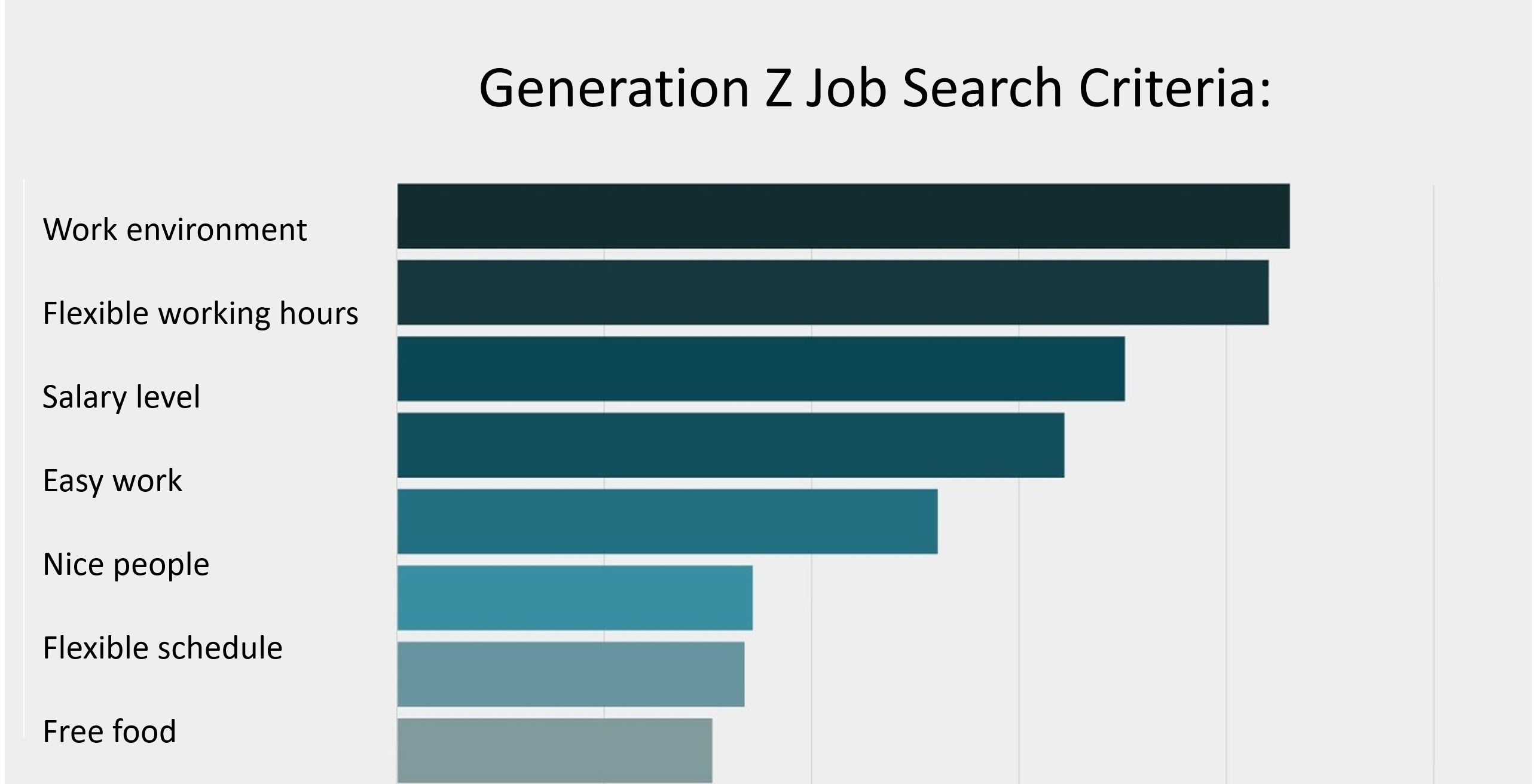What do zoomers want from a recruiter: the peculiarities of hiring a special generation
Zoomers are the young people born between 1996 and 2010. Today, they already make up a significant percentage of those who are fighting for a place in the sun. The Center for Generational Kinetics points that in the near future they will be the ones actively entering the labor market. So, what does a zoomer want from a recruiter? Let’s try to analyze it with our experts.
The digital world and office phobia

Daria Selivanova, Psychologist, Head of the Psychological Center “Don’t Panic”
Zoomers are not like older generations, because their entire adult life is spent on the Internet and social media. Moreover, many of them remain “environmentally friendly” in other areas, for example, trying to lead a healthy life by giving up bad habits (smoking, alcohol, etc.). In addition, many zoomers choose vegetarianism and sincerely support eco-activism.
“Zoomers are annoyed by the norms and unreasonable rules traditionally imposed by society, but they defend their opinions and beliefs. Zoomers are impatient, they do not want to do boring work, and they have what is known as ‘office phobia’. At the same time, they demonstrate remarkable abilities in multitasking projects,” says Daria Selivanova, Psychologist, Head of the Psychological Center “Don’t Panic”.
Zoomers are very critical of recognized, “distinguished” influencers, and at the same time are able to evaluate employees who are more professional than they are. Of course, if they can prove it.
Young people are also very freedom-loving, they want to express themselves, they want to add creativity even to everyday things. They do not want to wait, because they want to be involved in big events and useful things here and now. That is why the story of the “career ladder” is not about zoomers.
But there is a spoon of tar in a barrel of honey. The communication skills of this generation are often similar with the one in social media. And this is not always real life. According to Daria, this is why zoomers have some difficulties in teamwork offline. “They do not want to be dependent on their employer, they cherish the dream of their own company or business. And despite the fact that they appear to be very independent, they still want to be supported, reassured, and advised”.

But the fact is that it is extremely difficult for a zoomer to make a decision about his/her future profession, often not realizing that it is what he/she likes or not. And even if they do make a decision, it may be temporary, and their priorities may change tomorrow. Hence the explanation of why zoomers very easily quit one job and are in no hurry to take another. Yes, they are ready to work 24/7, but only if they understand what they will get later.
In return, having analyzed the CleverStaff database, we have calculated that more than 20% of the candidates in the system are 25 years old or slightly older. This is a large percent that already has established requirements for employers and becomes an impetus for research. For example, Deloitte has studied in detail the value of zoomers in the context of a “dream job” – from purely individual tasks to maximum flexibility of companies.
And Glassdoor has identified the criteria for what they consider to be a “good” job:

“Someday, in the future, you will be able to…” is not for zoomers

Svitlana Maiboroda, Group Team Leader at Smart Solutions
“Zoomers perceive employers’ flexibility towards them as the norm”, comments Svitlana Maiboroda, Group Team Leader at Smart Solutions, “Financial issues and comfortable corporate culture come for the zoomer first. But they are hardly inclined to make long-term career plans in the same company”.
Svitlana speaks favorably of communication with “digital natives”: they are efficient, can be the first to contact a recruiter, respond quickly to messages, and are open to suggestions.
That is why they easily accept new offers and easily leave the “old” company if they work without promotions or do not evolve.
As for skill sets, zoomers often know a foreign language, have studied or done internships abroad. Therefore, they quickly accept new conditions and know how to use their “chance”.
According to Svitlana’s own experience, foreign companies treat young Ukrainian specialists favorably, recognize their professionalism and often propose decent offers.
But zoomers are inherently overconfident, and this hinders them. For example, there was a case when a candidate, after an interview with a manager, already believed that the offer was his, because he was the best! And he was sincerely offended when it did not work out that way, and then he recalled many times how unfairly he was evaluated in that company.
At the same time, the zoomers easily forget about what turned out to be of no interest to them without informing the recruiter. Once a candidate took a week to “think about it” and disappeared. Later it turned out that he already had a better offer, and the fact that he promised to inform us of his decision in a week – well, he forgot, it happens…
At the interview stage, zoomers try to assess whether it is promising to deal with this employer in terms of finance, development, and corporate profits. If they have doubts or if the prospects are incomprehensible and unclear in the context of a year or two, they do not regret changing direction and looking further, even if they need to learn or master something.
“In the coming years, zoomers will make up more than 50% of working people. This is already affecting and will continue to affect the labor market. Therefore, companies will have to become even more flexible, maneuverable and adaptive to work with this generation”.
What will help in hiring the digital natives?

Anna Vasiukhno, Founder of the recruiting company A-HR
This opinion is shared by Anna Vasiukhno, Founder of the recruiting company A-HR. “Broadcast the company’s flexibility, emphasize specific opportunities, talk about current projects that can at least theoretically involve your zoomer – because they have a strong demand for professional growth”, Anna recommends.
You also need to be prepared for the fact that during the interview, the young candidate will immediately ask the question “Can I not come to the office?”. Zoomers do not like strict schedules and often ask to work remotely or at least in a hybrid format. Work-life balance is very important to them, but if the employer offers a decent financial reward, they are ready to work overtime.
The zoomer will be grateful to the recruiter not only for the vacancy, but also for planning the future and additional benefits. It can be training, an internship abroad, etc.
It is worth remembering that this generation is always impatient and nervously waiting for feedback. If the employer refuses, they want to know why in detail. After all, zoomers are outspoken and demand the same from others. They often honestly admit that they do not agree to the offer because they are waiting for a more solid offer from another company. And despite all this, it is an advantage for hiring. After all, representatives of older generations are shy about “other options”, delaying the hiring process.
To ensure that zoomers actively respond, the vacancy posting should be presented in a decent way. I advise you to avoid archaisms like “young friendly team” or “coffee and bagels”. The vacancy description should be specific and clear to grab zoomer’s attention in a matter of seconds. Otherwise, he will rush on.
Avoid over-emphasized slang, because the recruiter’s attempt to approach young people in this way seems insincere. It is better to pay more attention to a clearer formulation of tasks through the prism of professional growth and profitable opportunities.
Sometimes it happens that a candidate wants to get to know the future team before making a final decision about a new job, and this should be treated with respect and a mini-meeting should be organized.
“During an interview with a zoomer, always focus on his/her personal contribution, which will be important for the company and will be appreciated. After all, it is very important for a young candidate to feel that he/she is doing a worthy, meaningful job”, says Anna.
P.S. While we are analyzing the zoomers, scientists are already vigorously discussing the new “alphas”. This is the generation that started being born after 2010. Even Instagram is a little older than them. They say that they will definitely be a real mystery for recruiters, employers, and society as a whole. Well, let’s wait :).